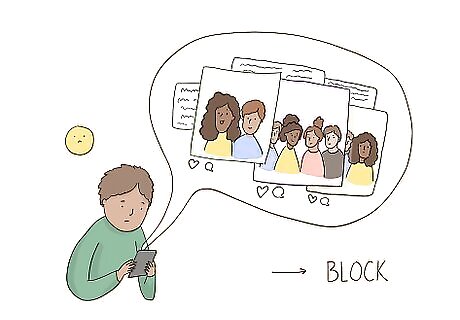
views
Setting Boundaries in Public

Avoid places they're likely to visit if you can. Do your best to stay away from their favorite restaurants and stores, as well as their workplace. If you don't cross their path, they'll be easier to ignore. Take this opportunity to try out new places and experiences. You may not be able to avoid them if you work or go to school together. In that case, switch up your routine so you won't cross paths as often. For example, you might take a different hallway to get to class or go to your locker during a different passing period.

Avoid eye contact and use closed body language when you see them. Averting your eyes sends the message that you don't want to talk. It can also give them the impression that you don't see them. Additionally, make yourself look unapproachable by keeping your chin down and looking away from them. Cross your arms across your body to shut them out. If you're sitting down, cross your legs. Keep your eyes forward and focus on where you're going. If they're right in front of you, look down or away. You might pretend to check your phone. If necessary, you can frown or look angry. This can show them you're not in the mood to talk.

Act busy or listen to music to avoid an interaction. Check your phone and act like you've just seen an important message, or pull out your homework or client file to review it one last time. Listening to music while walking the halls or working will help you minimize your interactions with everyone, including the person you're ignoring. If someone else you know is close by, start a conversation with them. If you appear to be busy with something else, you'll have a reason to ignore them. If you find music distracting at work, wear your earbuds but don't play music. They'll never know you're just wearing the earbuds to ignore them. While walking the halls at school, pretend to use your phone or check over your homework. If you're in class, take notes or write in your planner. At work, focus on your job tasks, and stay out of the break room as much as you can.

Walk away from them if you can. When you bump into them, like at a restaurant or store, put some distance between you. Cross the room, move to another location, or leave, depending on what's most comfortable for you. At school, you might duck into the bathroom or library. If you're in a class or an after school club with the person, try starting a conversation with someone else to block them out. You could also wait to enter the classroom or club meeting space until just before it starts. If you're at work, go into a coworker's cubicle or office to discuss work issues.

Treat them with formality if they try to talk to you. Don't simply ignore them, as this makes you appear immature. Instead, speak to them calmly and politely. Say as little as possible, then excuse yourself from the situation. Give them the shortest response possible, keeping your tone neutral. For example, you might say, “I'm not sure what I'm doing this weekend, but right now I need to get to class.”

Switch seats or find a new workspace if you sit near them. At school, ask your teacher if you can switch to a new seat. It helps to sit near someone else you know so that you can pretend like you're just choosing to sit with them. At work, you might move to a new cubicle or arrange your cubicle, desk, or office to create more privacy. At school, you might say to your teacher, "I'm having trouble focusing on my work where I'm sitting now. Can I move closer to the front of the room?" If you can't switch seats, try to create a barrier between the two of you. Set up a folder between your desks to act as a divider. Keep your supplies on the side of your desk that's closest to them. If you can't move workspaces, set up a bulletin board, calendar, or inspirational poster that blocks them out.

Eat lunch somewhere different if you normally eat together. Lunch can become an awkward situation if you normally eat with them or at the same table. Changing your routine will make it easier to ignore them, especially if they keep trying to talk to you. If you have to eat lunch with them, ask your mutual friends to act as a buffer. Switch tables in the cafeteria or ask if you can eat lunch outside. You could also eat your lunch quickly and then go hang out in the library. If you normally eat lunch in the breakroom at work, go out for lunch or eat in your car or cubicle.

Minimize conversations with them at events hosted by mutual friends or family. If you're ignoring a friend or relative, it's likely you'll both be on the guest list for parties and holidays. If they speak to you, it's best to respond, as pretending you don't hear them is passive-aggressive. However, you don't have to engage in long conversations with them. Talk to your other friends or relatives instead. Consider asking your closest friends or relatives to act as a buffer between you and the person you're ignoring, if necessary. You might say, "I'm trying to spend time away from Katie, and I know she'll be at Thanksgiving. Will you give me a reason to step away if she starts talking to me?" If you feel like you can't be around the person at all, it's okay to politely decline the invitation to an event you know they'll be attending. In most cases, it's best to keep your reason to yourself so that the host doesn't feel like they have to choose between you and the person you're ignoring when planning events.

Surround yourself with supportive friends while at public events. You might encounter the person frequently at events like local little league games, religious services, or your neighborhood park. If you know you might bump into them, ask supportive people in your life, such as your partner or best friend, to go with you. They can make it harder for the person to talk to you or steal your attention away from the event you're attending. Just having someone with you can make it easier for you to keep out the person you're trying to ignore. If you look involved with someone else, you'll seem less approachable.
Creating Distance at Home

Spend more time alone in your room. Eat your meals, watch your favorite shows, and relax in your own room. Ask them not to intrude on your privacy, or install a lock. Use your time alone to do things that are important to you, such as study, engage in hobbies, or read. If you share a room with the person you're trying to ignore, look for a spot where you can hang out for a while. For example, you may be able to spend time in the garage, outside on the porch, or curled up under the window. You could also spend more time outdoors, at a friend's house, or hanging out in places you enjoy.

Block them out with earbuds while you're in shared spaces. You could listen to music or watch your favorite shows on your phone or laptop. While you're wearing earbuds, you won't be able to hear them talking to you. Plus, the earbuds give you a reason to ignore them without making them feel bad. You could also try noise-cancelling ear plugs as another alternative. Grab a book, a magazine, or your homework, then use your ear plugs to work in peace.

Keep necessary conversations short, unemotional, and to the point. When you live together, it's inevitable that you'll need to talk to them at some point. Give short, simple answers without elaborating on anything you have to say. Don't show any emotion, even if they've upset you. Give a polite response and move on so that the conversation will end quickly. You might say, “Today was good, but I need to study.”

Spend a few days away from home, if you can. If you're in the middle of a fight with a parent, partner, roommate, or sibling, staying with someone else for a few days can give things time to cool off. It's easier to ignore someone if you aren't around them all day. Consider staying with a friend or relative until you feel ready to talk to the person again. If you're not an adult, make sure you have permission from your parent or guardian before you leave home. You might say to your parent or guardian, "I feel like I need some space right now to deal with my feelings after our argument last Saturday. Can I go stay with Grandma this weekend?"
Avoiding the Temptation to Talk to Them

Unfollow or block them on social media. Ignoring someone you love is hard, but it's even harder if you can see everything they're doing on social media. Whether it's an ex or crush posting pictures with a new partner or a friend going out without you, keeping up with their current status will only make things harder for you. Click unfollow so you won't see their stories, or block them if the temptation is too much. You could also try a social media detox for a few days. If you're not accessing your feed, you won't see their stories!

Block their number in your phone if you're tempted to text. Ignoring an ex or a crush who isn't interested can be really hard, especially if you're used to texting them. Similarly, ignoring texts from a toxic relative can be difficult. Communicating with them will only hurt you! Do what you need to do to avoid sending that text, even if that means blocking their number. If you don't want to block them, consider changing their name in your phone to “Don't call Troy” or something similar. As another option, you could write their number down on paper, then delete it in your phone. That way you'll still have the number, but it'll be harder for you to call or text them.

Keep yourself busy so you aren't tempted to contact them. Start filling your day with activities that will help you reach your personal, educational, and career goals. Engage in a new or favorite hobby, try new places around your town, or take a class to learn a new skill. When you have a life full of things that are important to you, it won't be hard to ignore someone. Pick up a new hobby, like learning to play an instrument, drawing, or knitting. Audition for community theater. Make and sell a product. Try out all of the coffee shops in your area. Take a class at a local school, your library, your community center, or online. You can find free courses from major institutions at https://www.edx.org/.

Focus on building your other relationships. Spend more time with friends and relatives who are a positive influence in your life. Experiencing these fun, healthy relationships can help you remember why you're ignoring this person. Be the first to reach out to other people and make plans. Don't let a bad experience with a loved one make you cut yourself off. If you want to make new friends, use a site like meetup.com to find people in your area who share your interests. If you're still in school, you could join or start a new club.



















Comments
0 comment